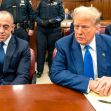In a chaotic day outside the downtown New York City courthouse yesterday, with persistent brides still arriving to get married and pro and anti-Trump crowds screaming their slogans for all to video, the 45th president of the United States, Donald Trump, 76, was fingerprinted and booked on 34 charges of falsifying business records in the first degree.
Overall, these charges stem from alleged hush money paid to Stormy Daniels, via his former trusted attorney Michael Cohen, during Trump’s 2016 presidential campaign.
Bragg’s office released a statement about the case and the 34 alleged fraudulent acts by Trump during his presidential election campaign.
“During the election, TRUMP and others employed a “catch and kill” scheme to identify, purchase, and bury negative information about him and boost his electoral prospects,” the statement says. “TRUMP then went to great lengths to hide this conduct, causing dozens of false entries in business records to conceal criminal activity, including attempts to violate state and federal election laws."
Due to the long list of charges, Manhattan District Attorney Alvin Bragg released a document called “statement of facts” to the public. This statement built a case against the former president, step-by-step, claiming Trump hid facts during his 2016 campaign in a scheme to elude negative press about his supposed affairs, including alleged hush money paid to Stormy Daniels and an affair with another woman.
Trump denied all charges.
The penal code offers guidance as to possible sentences Trump may receive if he is found guilty. The charges of crimes of falsifying business records can be grouped into separate categories:
- 12 counts of alleged falsifying accounting records for Trump’s reimbursements.
- 11 counts of falsifying and creating fake invoices for legal fees.
- 11 counts of payments written by Trump for Cohen, as reimbursements for money spent allegedly on Trump’s behalf, such as hush money. These payments, allegedly, were not for any legal services as they purported to be, but instead for secret hush-money payments to Stormy Daniels. Trump also allegedly paid $150,000 to Karen McDougal to keep quiet about a different affair.
The penal code provides maximum sentencing for specific charges if Trump is found guilty. The 34 charges against the former president may be plentiful but would not necessarily lead to a prison sentence.
Falsifying business records can be either a misdemeanor or a low-level (Class E) felony offense. is a low-level felony. The penal code, however, does provide harsher sentencing for falsifying business records with “intent to defraud.”The maximum penalty for each count if Trump is found guilty is four years of prison.
In addition to the 34 counts listed in the indictment, a public statement released by Bragg includes the possibility of an additional crime having been committed. Listing numerous, possible additional crimes by Trump, Bragg said there may be a violation of state election laws. This violation of state election laws, specifically, refers to the laws about any form of conspiracy to push the election “of person to public office by unlawful means.”
The statement of facts, according to law, does not have to prove any details of the charges, because it is just the indictment.
If Trump were found guilty of this felony, which stems from his alleged $130,000 hush-money payment to Stormy Daniels during his 2016 campaign, this means his actions promoted his chances to be elected president. If this is proven in court, Trump would possibly face a more serious felony conviction, with a maximum sentence of four years.
In the event Trump is convicted of “intent to defraud” in a second crime, he could face up to four years in jail. For a felony charge such as this, the statute of limitations goes from two years up to four years, and being found guilty means he could serve a one-year sentence up to a four-year sentence.
Beyond the scope of the alleged election fraud, the New York District Attorney’s office, in its release, said the scheme continued after Trump won the election.
“After winning the election, TRUMP reimbursed the Special Counsel through a series of monthly checks, first from the Donald J. Trump Revocable Trust – created in New York to hold the Trump Organization’s assets during TRUMP’s presidency – and later from TRUMP’s bank account. In total, 11 checks were issued for a phony purpose. Nine of those checks were signed by TRUMP. Each check was processed by the Trump Organization and illegally disguised as a payment for legal services rendered pursuant to a non-existent retainer agreement. In total, 34 false entries were made in New York business records to conceal the initial covert $130,000 payment. Further, participants in the scheme took steps that mischaracterized, for tax purposes, the true nature of the reimbursements.”






